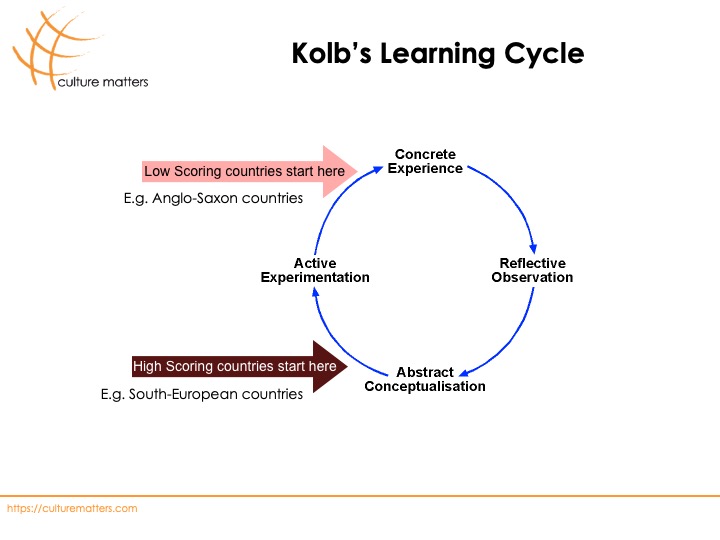THE IMPORTANCE OF EDUCATION: Tell Me Something I Don’t Know
As you’ve come to get familiar with my topic on culture and cultural differences within the association community, my statement is: “nothing is culturally neutral”. So is the case with learning and education: different cultures learn and teach differently. Both formally and informally.
Here are some examples.
How Do We Learn?
Different cultures learn things differently. For instance: Anglo-Saxon cultures prefer to start their learning process or learning curve with a practical example, as a case study. These case studies (or stories or examples) lead to a practical framework, which could but not necessarily, lead to a theoretical framework.
The basic question that needs to be answered in Anglo-Saxon learning is: “Show me that it works and how I can use and benefit from it”.
For the French (and e.g. Belgians, Italians, and South Americans) this is not the way to do things. In those cultures, you start with a theoretical framework. From there you get to the practical parts. The American David Kolb has done some excellent research on this.
The cultural dimension here is predictability (read more about that here).
Below you can see Kolb’s Learning Cycle.

Reading a Curriculum Vitae Correctly
Assessing whether you have the right candidate often starts with assessing someone’s CV. But those are also not culturally neutral.
An American assessing the CV of a German or Swede will often wonder if they found the right person in the first place. The reason being is that CVs of Germans and Scandinavians are often relatively moderate but also very factual.
E.g. if a Swede speaks only three words of French, his or her CV will read “Level of French: 3 words”. The American will wonder: is that all he or she can do? The answer is yes! And he/she can do it all!
Turn the tables and a Scandinavian HR manager assessing the CV of an American will often think that he/she has Superman in front of him/her. This is because in the US you need to polish or brush up your CV significantly to stand out in that market (read culture).
Giving and Receiving Feedback
Question: what kind of feedback do you most often get from clients, peers, or managers?
Most people will say negative feedback. But in most cultures, you will get a compliment or positive feedback every now and then when you’ve done something right.
Not in Scandinavian countries and the Netherlands. There, positive peer-to-peer assessment is generally seen as suspicious. “What do you want from me?” is often thought of when receiving too explicit positive feedback. Hence the Nordic countries, and the Netherlands additionally, give positive feedback rather sparsely. Keep this in mind when giving peer-to-peer feedback.
Putting it All Together
The topic of education across cultures is a very delicate one. Because if you don’t get it right people will recent the learning and hence will not learn or not accept what needs to be learned. Keep the above considerations in mind and you’re halfway there.
Read here why e-learning to understand different cultures is a bad idea.
Want to better understand different cultures and learn how to work with them? Get in touch with Chris at culturematters.com or write him an email at chris.smit@culturematters.com.
Get a Taste of How Chris Presents, Watch his TEDx Talk
 Call Direct: +32476524957
Call Direct: +32476524957
 European Office (Paris) Whatsapp: +32476524957
European Office (Paris) Whatsapp: +32476524957
The Americas (USA; Atlanta, GA; también en Español): +1 678 301 8369
Book Chris Smit as a Speaker
If you're looking for an Engaging, Exciting, and Interactive speaker on the subject of Intercultural Management & Awareness you came to the right place.
Chris has spoken at hundreds of events and to thousands of people on the subject of Cultural Diversity & Cultural Competence.
This is What Others Say About Chris:
- “Very Interactive and Engaging”
- “In little time he knew how to get the audience inspired and connected to his story”
- “His ability to make large groups of participants quickly and adequately aware of the huge impact of cultural differences is excellent”
- “Chris is a dedicated and inspirational professional”
In addition, his presentations can cover specific topics cultural topics, or generally on Cultural differences.
Presentations can vary anywhere from 20 minutes to 2 hours and are given World Wide.
Book Chris now by simply sending an email. Click here to do so.
Read more about what Chris can do for you.
- Percentage of People Rating a Presentation as Excellent 86%
- Rating the Presentation as Practical 89%
- Applicability of Chris' presentation 90%
About Peter van der Lende

Peter has joined forces with Culture Matters.
Because he has years and years of international business development experience joining forces therefore only seemed logical.
Being born and raised in the Netherlands, he has lived in more than 9 countries of which most were in Latin America.
He currently lives in Atlanta, Georgia (USA) with his family.
You can find out more at https://expand360.com/
Or find out what Peter can do for you here.
- 178 Toby Mildon - 8 May 2024
- 177 Mark Steinberg - 22 February 2024
- Japanese versus Western Culture - 24 January 2024

